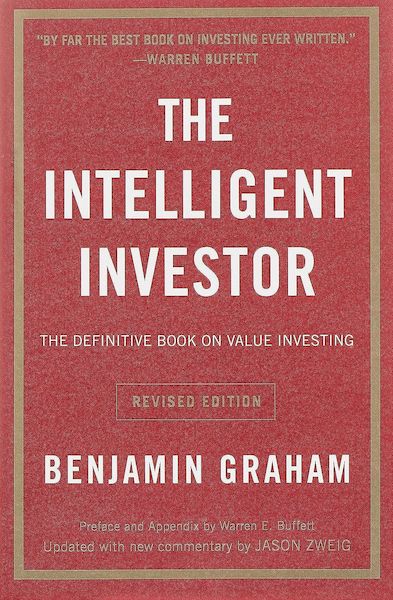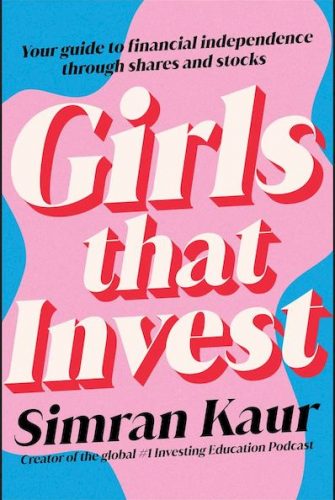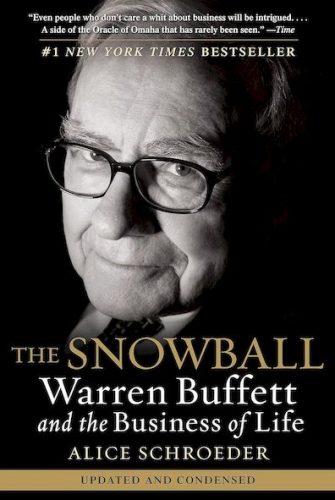Published in 1949, yet timeless in its wisdom, Benjamin Graham’s “The Intelligent Investor” remains a cornerstone of sound investment practices. Forget the get-rich-quick schemes and market hype; this book empowers you to navigate the financial world with discipline, rationality, and a focus on long-term value.
Inside, you’ll discover:
- The two investor types: Are you a defensive player seeking safety, or an enterprising one aiming for growth? Graham helps you identify your approach and build a strategy that aligns with your goals.
- The dangers of speculation: Learn to distinguish between calculated investment and risky gambling. Graham exposes the pitfalls of chasing trends and emotional decisions, guiding you towards a more measured approach.
- The power of value investing: Forget the market frenzy and focus on the intrinsic worth of companies. Graham unveils strategies to identify undervalued stocks with the potential for substantial returns.
- Essential investment principles: Learn about diversification, the margin of safety, and understanding financial statements. These timeless principles will equip you to make informed decisions and weather market fluctuations.
But wait, there’s more!
Want a quick overview of the book’s key points before diving in? Check out our free summary of “The Intelligent Investor” by Benjamin Graham. It’s a concise guide that distills the essence of the book, providing a taste of the valuable insights waiting for you within.

Main Points of “The Intelligent Investor”
- Value Investing vs. Speculation: Differentiate between long-term, value-focused investing and short-term, speculative gambling. Avoid the pitfalls of chasing trends and emotional decisions.
- Investor Types: Identify your investment style – defensive (prioritizing safety) or enterprising (seeking growth) – to build a personalized strategy.
- Identify Undervalued Stocks: Learn strategies to uncover stocks with intrinsic value that the market has overlooked, offering the potential for significant returns.
- Financial Statement Analysis: Understand how to analyze financial statements to assess a company’s true worth and potential.
- Diversification: Spread your investments across different asset classes and sectors to mitigate risk.
- The margin of Safety: Invest in assets with a significant difference between intrinsic value and market price, providing a buffer against potential losses.
- Invest with discipline and rationality, focusing on long-term value.
- Knowledge and a solid foundation are crucial for success.
Summary: The Intelligent Investor
Today’s financial markets are vastly different from their state in 1949 when Benjamin Graham penned The Intelligent Investor. Stock valuations have significantly risen, and the savings bonds that Graham commended are no longer appealing investments. Graham illustrated the markets through a character named “Mr. Market,” an imaginary figure who provided investors with a daily price at which he would either buy their stock or sell them more. In general, Graham recommended that investors pay no heed to Mr. Market. Nevertheless, present-day investors are engaging in “1,500 times as much business with him as they did nearly half a century ago,” resulting in many investors disregarding this valuable counsel.
“What the genuine investor in common stocks requires is not an extensive amount of brains and knowledge, but rather some exceptional qualities of character.”
Graham would likely have viewed today’s surfeit of speculative trading with skepticism. He would definitely have censured the transition from owning stocks to leasing them, as short-term stock possession provides investors with minimal motivation to exercise responsible supervision. Nonetheless, Graham’s insights regarding “defensive” and “enterprising” investors remain accurate. He also foresaw the incapacity of fund managers to achieve a return exceeding the market average.
“Investment is at its most astute when conducted in a businesslike manner.”
His focus on long-term ownership indicates that he would have supported the concept of an index mutual fund. Prior to his passing, in an interview, he advocated that investors should strive to obtain at least the average market return from a fund. Graham conceded that his notions might not stand the test of time; nonetheless, some of his principles endure, such as his belief that speculation usually leads to losses. Contemporary investors would benefit from his urgings to purchase when others are keen on selling and to sell when others are eager to buy, and to conduct adequate research before investing.
“Nothing in finance is more absurd and detrimental… than the firmly entrenched attitude of common stock investors and their Wall Street advisers regarding matters of corporate management.”
The Intelligent Investor
Investors – as opposed to speculators – fall into two main categories:
- Defensive – This type of investor aims to safeguard capital, minimize errors, reap favorable returns, and hedge against inflation. Defensive investors seek safety and independence, hence they are recommended to allocate up to 40% of their funds in savings bonds and a significant portion in common stocks, both as protection against inflation and as an opportunity to earn dividends and benefit from stock appreciation.
- Enterprising (or aggressive) – This investor endeavors to purchase securities below their intrinsic value. Enterprising investors may seek profits by trading based on market averages, selecting stocks that outperform the market, opting for growth stocks, identifying bargains, and overall, buying when the market is pessimistic and selling when it is optimistic. Efforts to outpace the market average and select winning stocks lean more towards speculation than investing, but the other methods are genuine investment strategies. Acquiring undervalued securities that offer a “margin of safety” might be the most secure path to wealth, provided you devote time and effort to becoming an investment authority.
“This attitude is captured in the phrase: ‘If you are dissatisfied with the management, divest your stocks’.”
Investing is a business, and investors should treat it as one. Numerous business professionals who exhibit prudence in their endeavors seem to abandon this discipline when confronted with Mr. Market. Intelligent investors are not necessarily brilliant, clever, or insightful, but they perceive the market as a business. Achieving success in investing is more about character than intellect. An investor must possess the fortitude to resist impulses to speculate, seek quick gains, and follow the herd.
“Competent managements result in a favorable average market price, whereas inept managements lead to unfavorable market prices.”
Market Trends
Speculators aim to profit from market fluctuations. Conversely, investors aim to procure quality stocks at favorable prices and retain them. Market movements are significant solely because they present prices at which it becomes wise for the investor to buy or sell. The typical investor should not wait for the market to decline before acquiring stocks. As long as prices are not unreasonably inflated, you should strive to construct a stock portfolio through judicious buying patterns such as averaging.
“Only in rare cases, where the integrity and competence of advisors have been thoroughly demonstrated, should the investor act on the advice of others without comprehending and approving the decision made.”
Many investors attempt to pinpoint stocks that will surpass the market in the short term. This is too akin to speculation to warrant recommendation. The stock price incorporates information regarding forecasts of higher or lower prices (both constantly exist in the market, for any stock) and reflects the cumulative effect of these perspectives. The value investor can disregard daily price fluctuations.
“The intelligent investor (requires) an ability to resist the allure of salespersons offering new common-stock issues during bull markets.”
Portfolio Strategies: Defensive, Aggressive, and Enterprising
Financial advisors can be beneficial but do not rely entirely on them for guidance on how to profit. Professionals can aid in achieving a minimal risk level and conservative income, and financial institutions can furnish economic and market data – yet do not place excessive emphasis on their market projections. Brokerages are more akin to enterprises than professional establishments, such as law firms. Investment bankers are salespersons who view clients as potential purchasers for the securities they underwrite.
“Some of these issues may turn out to be excellent purchases – a few years down the line, when there is minimal interest in them and they can be acquired at a small fraction of their actual value.”
The method of utilizing advice and advisers hinges on whether you are a defensive or enterprising investor. Defensive investors should restrict their security acquisitions to relatively low-risk, high-quality bonds and stocks. They merely need relatively basic, uncomplicated advice concerning which stocks match their criteria and whether prices are reasonably aligned with historical averages.
“A primary indicator of a competent analyst is their capacity to differentiate between significant and insignificant facts and figures in a given scenario.”
On the other hand, enterprising investors should collaborate with advisers and seek detailed justifications and recommendations. A well-diversified stock portfolio is not overly hazardous for a defensive investor. While stock prices fluctuate, the investor does not incur losses merely due to the market price decline. The investor truly incurs a loss only by selling at a lower price than the purchase price.
“The process of selecting the ‘finest’ stocks essentially boils down to a highly contentious matter. Our suggestion to the defensive investor is to avoid it altogether.”
Aggressive investors should rely on their discernment and consult advisers not for directives but for supplementary knowledge to complement their expertise. Two portfolio management principles are relevant to the aggressive investor: Firstly, steer clear of purchasing corporate bonds since US savings bonds present nearly equivalent returns and considerably lower risks. Secondly, avoid high-quality preferred stocks. Lower-quality preferred stocks and corporate bonds represented below are a few prudent investments when prices are at least one-third below par. It is advisable to steer clear of foreign bonds, as well as convertibles and common stocks with exceptionally high recent earnings performance. Freshly issued stocks are deemed alluring investments solely when they fall out of favor and trade at a value less than their true worth. The resourceful investor has the potential to derive gains by:
- Employing “Market timing” – Attempting to purchase during a market downturn and selling when it ascends is both enticing and perilous. Future market ups and downs might not mirror past transitions. The solitary advantage of market timing formulas is that they could prompt investors to act as contrarians, going against the mainstream buying and selling trends. This is a logical approach – although other aspects of market timing hold minimal value.
- Focusing on “Growth stocks” – Recognizing stocks with a history of superior performance is relatively straightforward, but predicting their future performance poses a challenge. It is advisable not to pay excessively for growth.
- Seizing “Buying bargains” – Bonds and preferred stocks may prove to be worthwhile acquisitions when they trade below par value. Common stocks can be bargains if their intrinsic value surpasses the market price. Occasionally, certain stocks may trade at a lower price than their working capital value. Additionally, secondary stocks within an industry might also be considered bargains, as the market tends to overstate the risks associated with stocks that are not market leaders. Investors who acquire underpriced stocks can enjoy substantial returns through high dividends, earnings reinvestment, and price appreciation over time or as the result of a bullish market.
- Exploring “Special situations” – Instances such as bankruptcies, reorganizations, mergers, and similar scenarios can present profit prospects. Frequently, the market undervalues stocks significantly due to concerns such as a company’s potential legal entanglements.
“Insiders never suffer loss from an unduly low market price which it is in their power to correct. If by any chance they should want to sell, they can and will always correct the situation first.”
Aggressive investors necessitate a significant level of expertise to engage effectively in what essentially amounts to an investing enterprise. There exists no middle ground between a passive and an active approach. Since only a limited number of investors possess the requisite knowledge and temperament to operate aggressively, most investors should opt for a defensive strategy.
“It is amazing to see how many capable businessmen try to operate in Wall Street with complete disregard of all the sound principles through which they have gained success in their own undertakings.”
Guidelines for Evaluating Stocks
The ensuing 11 guidelines can offer direction to investors and analysts:
1. Before appraising value, gauge the company’s earning potential, multiply aptly, and adjust for asset valuation.
2. Earning power serves as an estimate of a company’s earnings across five years.
3. Determine a company’s mean earnings over these five years by averaging prior years and then extrapolating revenues and margins ahead.
4. Revise prior figures to accommodate any capitalizations within the company.
5. Use a minimum multiplier of eight and a maximum of 20, allowing for earnings fluctuations in the long run.
6. If the valuation based on earning potential exceeds the tangible asset value, deduct it from the earnings appraisal. A suggested deduction entails subtracting one-quarter of the surplus earnings-power value exceeding twice the asset value, permitting a 100% premium over tangible assets without penalty.
7. If the earning power valuation falls below the net current asset value, add 50% of the variance to the earnings-based value.
8. In peculiar circumstances related to war, rentals, or temporary royalties, adjust the appraised value accordingly.
9. Allocate value between stockholders and bondholders or preferred stockholders. Before proceeding, ascertain the enterprise value presuming a capital structure solely consisting of common stock.
10. The more aggressive the capital structure (i.e., more debt and preferred stock relative to common stock), the less reliance can be placed on the appraised value when making decisions.
11. A stock appraisal diverging one-third richer or poorer than its current market value could serve as grounds for a buy or sell decision. In instances of less divergence, the appraisal is merely an additional factor in the analysis.
Shareholders and Executives
Stockholders assume both the rights and duties of ownership, and they should diligently and consistently exercise them. Nonetheless, practically, stockholders possess minimal authority. They usually follow management, regardless of its track record. While management tends to be competent, cases abound of inept or deceitful executives, warranting stockholders to demand accountability from them.
Stockholders, in particular, must evaluate the efficiency of management objectively. Despite managers playing a critical role in stock performance, investors appear largely indifferent to scrutinizing their caliber or striving to oust or enhance underperforming executives.
Stockholders must objectively measure the caliber of management. If returns dwindle even in prosperous industry climates, if profit margins lag behind the sector average, or if the company fails to maintain its market share, shareholders ought to seek clarification. Stockholders may assume that appointed directors will diligently safeguard their interests, but managers often influence the selection of directors. Various connections, including personal relationships, could bias directors in favor of management.
The Safety Cushion
The safety cushion, a crucial investment principle, serves as the gap between the intrinsic value of a business and the prevailing stock price. Investors should verify the presence of a sufficient safety buffer to safeguard against potential devaluations. For instance, before purchasing a railroad bond, an investor should ascertain if the company consistently earns enough to cover interest payments by a multiple of at least two over several years. Alongside the safety cushion, diversification can shield an investment portfolio.
Author Overview
Benjamin Graham (1894–1976), regarded as the architect of value investing, also penned the acclaimed works Security Analysis and The Interpretation of Financial Statements.



